Prime Minister Pham Minh Chinh held talks on January 9 with his host and counterpart Lee Hsien Loong during his official State visit to Singapore from January 8-10.
The two spoke highly of the positive development of relations in both the bilateral and multilateral aspects.
They agreed to intensify political trust; maintain exchanges and contacts at all levels and through all channels; promote economic cooperation; effectively implement cooperation agreements, including an MoU on the establishment of the Vietnam - Singapore partnership on the digital economy and the green economy signed on this occasion; and create favorable conditions for the implementation of cooperation in new fields and fields of potential such as digital, the green and circular economies, innovation, clean energy, and climate change response.
They also reached consensus on stepping up cooperation in defense and security, tourism, and people-to-people exchanges.
Prime Minister Lee affirmed that Prime Minister Chinh’s visit will create strong impetus for the fine strategic partnership between the two countries to develop further and is an important opening event of activities to celebrate the 50th anniversary of bilateral diplomatic relations and the 10th anniversary of the strategic partnership this year, adding that Singapore treasures and hopes to further strengthen its strategic partnership with Vietnam.
Prime Minister Chinh proposed that Singapore consider the possibility of signing a labor cooperation agreement between the two countries; increase the importation of agricultural and aquatic products and garments and textiles from Vietnam; and facilitate the sale of Vietnamese goods in its distribution networks.
With a stable political system and an increasingly improved investment environment, Vietnam welcomes and creates favorable conditions for Singaporean businesses to expand their investment in the country, especially in digital transformation, green energy, science and technology, and innovation, the Vietnamese leader stressed.
The Singaporean leader thanked Vietnam for approving the investment in VSIP Nghe An II and showed support for Prime Minister Chinh’s proposal on opening more industrial parks. He also emphasized his backing for cooperation in clean energy and electricity connection, transmission, and trading.
Prime Minister Chinh, meanwhile, asked Singapore to increase its support for Vietnam to develop and improve the quality of its human resources and carry out the Vocational Education Development Strategy in the 2021-2030 period.
Following the talks, the two leaders witnessed the signing and hand-over of cooperation documents, including an MoU on the establishment of the Vietnam - Singapore partnership in the digital economy and the green economy; another on a cooperation plan in economics and trade between the two ministries of industry and trade; one on youth cooperation between the National Committee on Youth of Vietnam and the National Youth Council of Singapore; and another on maritime cooperation between the Vietnam Maritime Administration and the Maritime and Port Authority of Singapore.
On the same day, Prime Minister Chinh met with Singaporean President Halimah Yacob, who hailed the significance of the visit as marking the start of celebrations over the 50th anniversary of diplomatic ties and the 10th anniversary of their strategic partnership this year, contributing to the strong and substantial development of relations. The two leaders agreed to deepen pillars of cooperation, especially in politics, economy, national defense and security, education and high-quality training, people-to-people exchanges, tourism, maritime connectivity initiatives, and new fields relating to Industry 4.0.


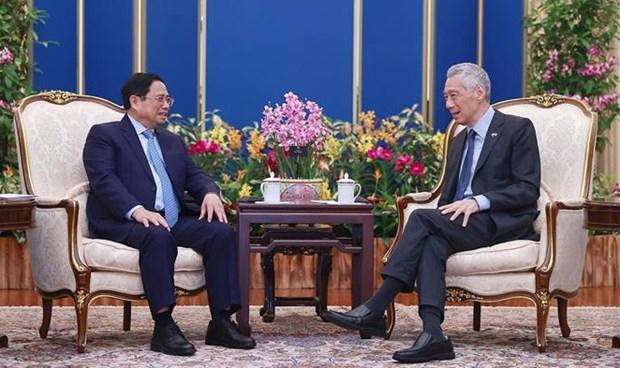

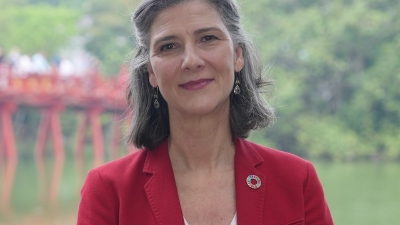
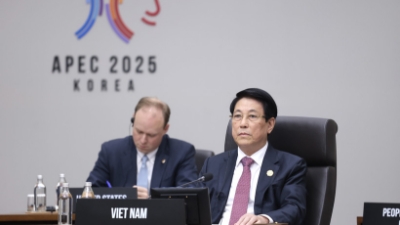

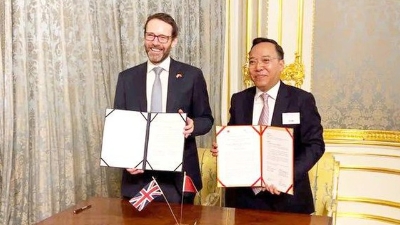
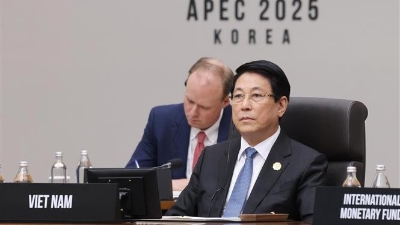
 Google translate
Google translate